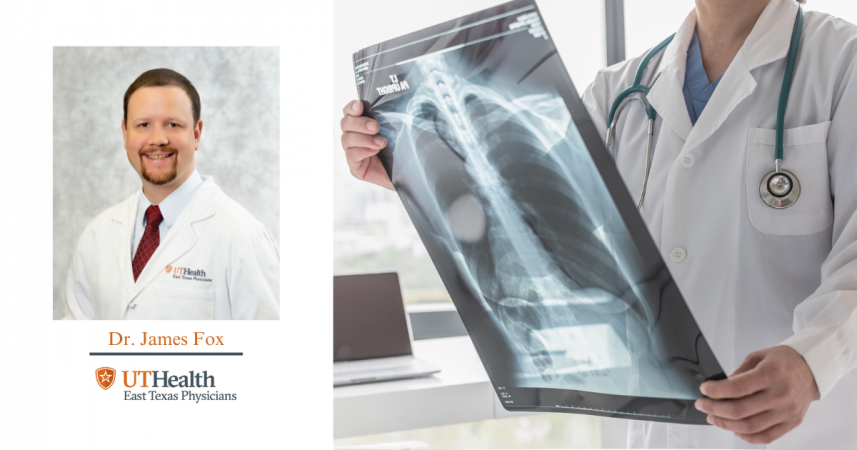James Fox, MD
Board-certified pulmonary and critical care medicine physician
Lung cancer is the leading cause of cancer death in the United States, ahead of breast, pancreatic and colon cancers combined. Per the American Cancer Society, 125,000 deaths occur each year related to lung cancer.
Lung cancer can start as a single nodule, often referred to as “a spot on the lung.” While most nodules are benign (non-cancerous), some are early signs of lung cancer. A lung nodule is more likely to be cancer if you have a history of tobacco use.
One of the greatest risk factors for developing lung cancer is smoking. The more you smoke and the longer you smoke, the higher your risk for lung cancer. Smokers who quit greatly reduce their risk of developing lung cancer and dying from the disease. UT Health East Texas offers a comprehensive tobacco cessation program. If you are ready to quit, call us at 903-877-QUIT.
Lung cancer screening is a regular preventive health check, much like a colonoscopy or mammogram. Screenings help find lung nodules and/or cancer at an early stage when it is small and more likely to be treated successfully. Lung cancer screening has been shown to lower the risk of dying from lung cancer.
A low-dose chest CT scan is the recommended screening exam for lung cancer.
To qualify for lung cancer screening, a person must be:
· 50 to 77 years old
· Currently smoke or have quit smoking in the past 15 years
· Have 20 pack-year smoking history (For example, smoking one pack of cigarettes a day for 20 years or two packs a day for 10 years.)
· No known symptoms of lung cancer
UT Health East Texas is designated a Lung Cancer Alliance Screening Center of Excellence. We offer access to low-dose CT lung scans, the most current and effective screening available.
Additionally, if lung nodules are detected, you will be referred to our Lung Nodule Program. This program offers a comprehensive approach to follow-up management of lung nodules. Our team is comprised of specialists in pulmonary medicine, radiology, thoracic surgery and medical and radiation oncology. The goal is to detect lung cancer early and simplify the process for patients by eliminating unnecessary office visits and procedures, all while ensuring timely follow up and optimal care.
Additionally, every patient in the Lung Nodule Program has access to a Nurse Navigator, who will educate and guide them through the process.
To discuss eligibility or schedule an appointment, please call 903-877-7008. To learn more about our Lung Program, please visit UTHealthEastTexas.com/lungnodule.

